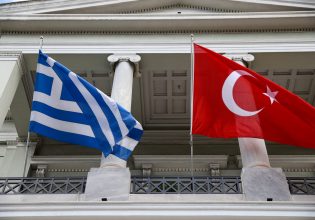
Tsipras’ address: Symbolism with no substance
The Prime Minister has lost the wager of offering true hope to a society which at some point was deprived of its income and its very future
If we accept the government’s narrative that 21 August is an historic milestone and the dawn of a new day for the country, then the prime minister’s address today should have been a political proclamation of objectives and an announcement of measures that will be taken to determine the next day.
On the contrary, the PM once again chose the path of symbolism. His speech focused on what is signaled by the formal “end of memorandums” and on a platitudinous presentation that attempted to describe the day after, without specific references and commitments, but rather with theatrics and communications objectives.
After all, the prime minister had little to say about the next day that would constitute a departure from the legacy of the memorandums.
He maintained in his national address that “the country is regaining its right to determine its own fortune and future”, but in fact the parameters of policy will be determined by creditors for a very long time to come.
One is confronted with a primary surplus of 3.5 percent until 2022 and 2.2 percent until 2060, pension cuts as of 1 January 2019, the lowering of the tax-free threshold as of 1 January 2020, privatisation that is in progress, a freeze on the overall amount of public sector wages, and enhanced fiscal surveillance by creditors. All of that means that Greece will be subjected to blackmail and external coercion.
Austerity measures and the “sacrifices of the Greek people” will continue for a long time.
It is not just certain Sirens that say “the memorandums will be here forever”. It is demonstrated by the reality of multiple surveillance mechanisms, “reforms” that cannot be revoked, continued privatisation, and commitments lasting for decades.
One would have expected greater modesty on the part of the PM when he refers to the Greek people.
Indeed, the Greek people did not compromise and “wrote new pages of resistance”, not hesitating to deliver an overwhelming “No” to the memorandum in the 2015 referendum, despite all the warnings about the dangers.
However, in that period the Tsipras-Kammenos government wrote new pages of capitulation and clung to power at all costs.
The path that the government chose then was not to be true to its pre-electoral pledges, but rather to do an about-face, leading to acceptance and religious implementation of the memorandum.
Privatisation, the Katrougalos law that brought pension cuts, and continued austerity can hardly be described as resistance. Workers, the unemployed and youth did not come out of the woods.
They remained “without a voice and without hope” during the Tsipras administration, struggling to survive in an environment of unemployment, part-time work, wages often under 400 euros monthly, and the push toward emigration.
These people do not need to hear again about the causes and the individuals that led the country into the memorandums, about the tax immunity of the rich, about generalised corruption, about the impunity of businessmen and publishing groups which for years thought they owned the country, and about the cynicism and contempt of the political elite.
All these people rose up against these situations and chose SYRIZA and Alexis Tsipras as the alternative solution, only to find that they brought a new corruption and a new cynicism. Instead of assuming responsibility for the Mati fire tragedy, they sought conspiracies via satellite photos.
These people truly revolted against a “neo-liberal experiment”. However, the policies of Alexis Tsipras’ government can only be called neo-liberal. They include privatisation, wage and pension cuts, the extension of labour precariousness, fiscal discipline, and the replacement of a redistribution of wealth with benefits.
In the framework of such policies, it is difficult to fit the demand for “a country of equality, democracy and social justice”.
It is not by chance that the prime minister chose on the day after to stick with metaphors and poetical phrases. He knows that beyond certain benefits, “just from this year”, from the “super-primary surpluses”, he has nothing to offer that would truly signal a major change for the next day.
He has lost the wager of offering true hope to a society which at some point was deprived of its income and its very future.
Still, Ithaca was pretty, with a bright sun and a summer mood, and perhaps the aim was to find people, as the poet Cavafy wrote, who were “charmed by the lovely spectacle – even though they knew what such things are worth, and how hollow were the words”.
Ακολουθήστε το in.gr στο Google News και μάθετε πρώτοι όλες τις ειδήσεις









































 Αριθμός Πιστοποίησης Μ.Η.Τ.232442
Αριθμός Πιστοποίησης Μ.Η.Τ.232442